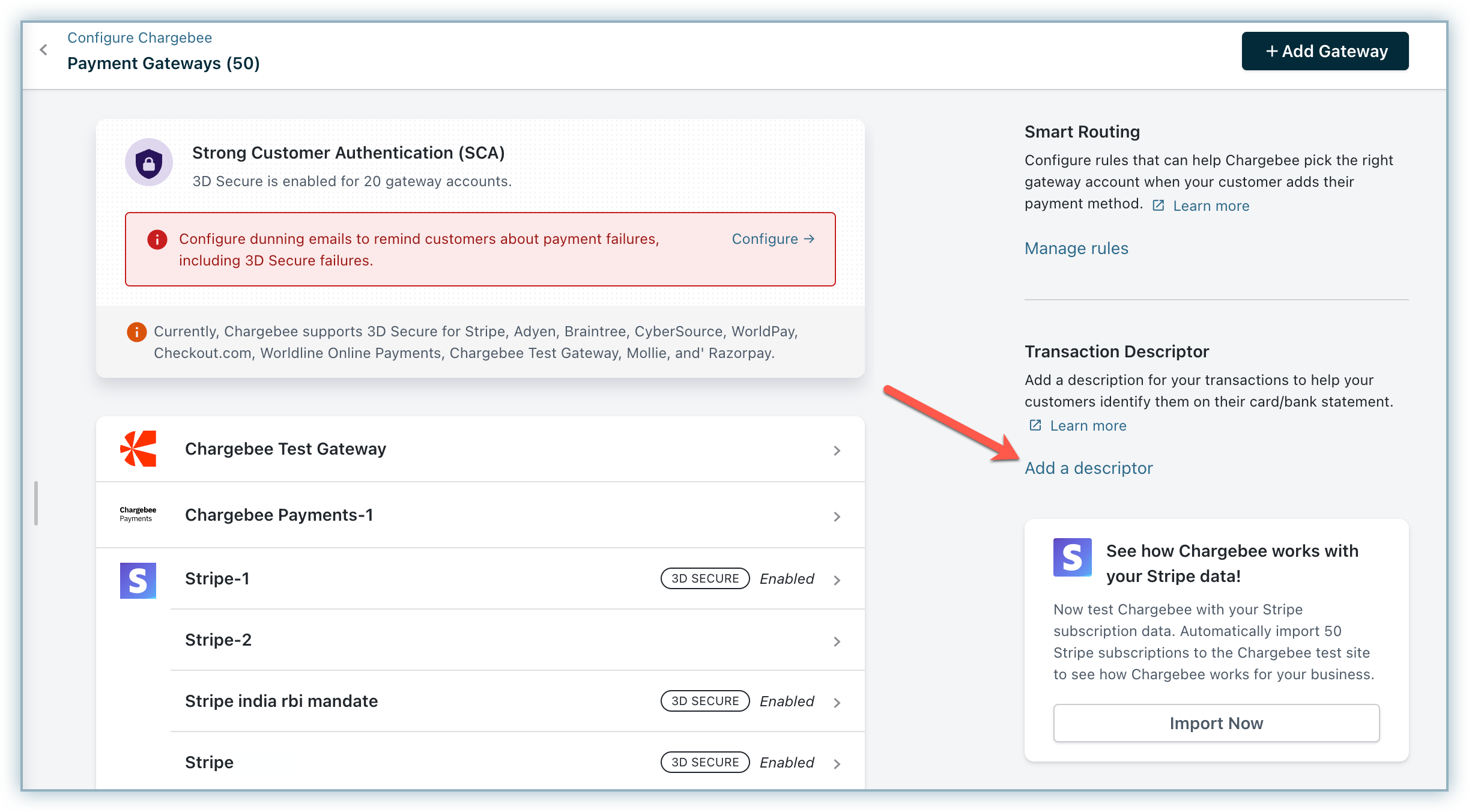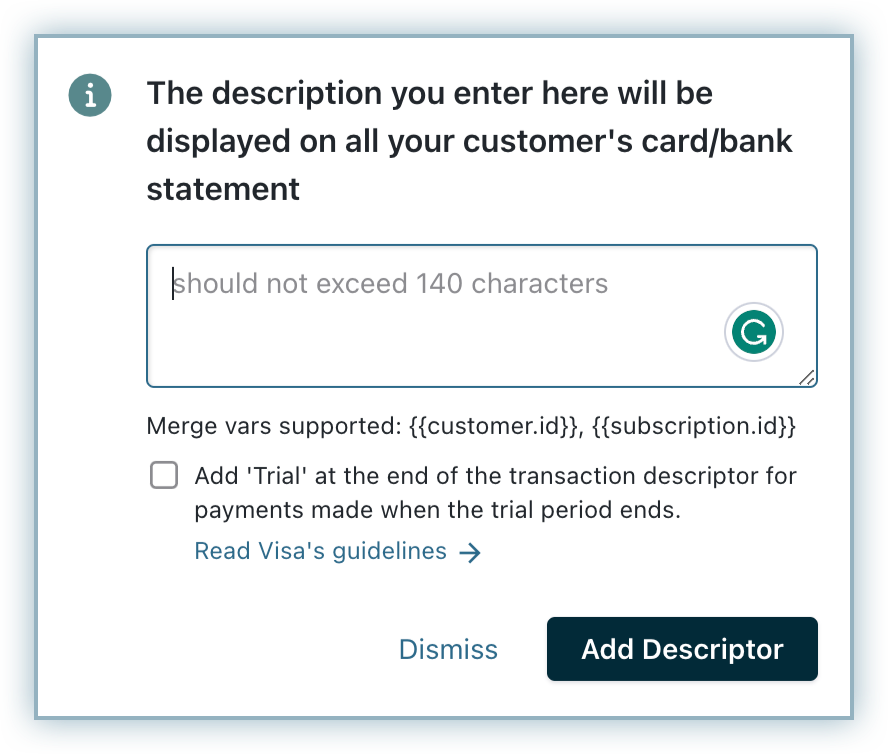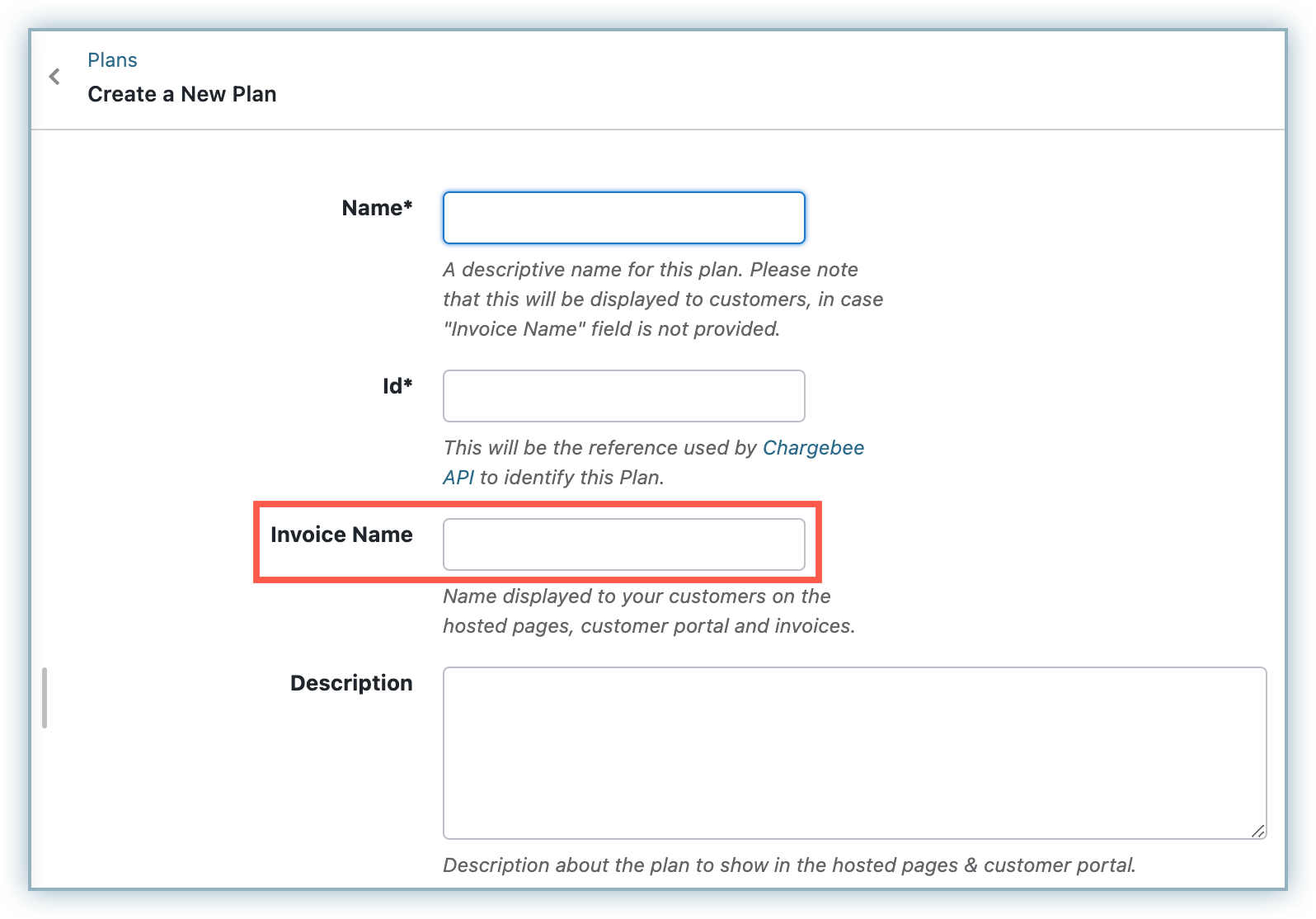A transaction descriptor is meant to describe a transaction in order to help your customer easily recognize the transaction.
Chargebee provides you with the option of adding the transaction descriptor that will appear on your customers' card/bank statements. However, the customer's bank will decide how these descriptors appear on the bank statement. This means, the bank can decide on the number of characters, capitalization of letters and words, and so on.
Additionally, the gateway you use may have several rules and restrictions about the descriptors that they pass on. The character limitations imposed by the various payment gateways we support, are as below:
A Transaction descriptor added is applicable for every gateway in your Chargebee site.
To configure the transaction descriptor from the Chargebee site, navigate to Settings > Configure Chargebee > Payment Gateways > Add a Descriptor

You can add a descriptor in the dialog box that opens.
Additionally, you can choose to pass Invoice ID, Plan Name, Customer ID, or Subscription ID along with the descriptor. Copy and paste the merge vars tag that you would like to use next to the descriptor.
The {{invoice.id}} merge var will work only if you have enabled Net D, so that Chargebee can send the final Invoice ID in the statement descriptor. Learn more
In case of multiple invoices or plans, the descriptor will be empty.
Suggestion: You can choose to put the business name as a suffix or a prefix along with the merge var depending on your business use case to make sure your customer receives the business name if the invoice.id or plan.name is not passed. Example: "{{invoice.id}} business name" or "business name {{invoice.id}}"

Here, the {{plan.name}} merge var will contain the value of the Invoice Name field that you add while creating a new plan.

In a Payment Intent flow, in case of 3DS and all redirection flows, we attempt the payment first and a subscription is created in Chargebee only if the payment is successful.
This is the reason why the Subscription ID or Customer ID is not populated in the transaction descriptors for the first payment.
However, all the consecutive payments have the desired ID. For non-3DS flow or if the payment is already verified, the Customer ID or Subscription ID is populated right from the first payment.
In situations involving multiple products or plans, a one-size-fits-all description is inadequate, and the customization of descriptors becomes crucial for business. Dynamic descriptors allow you to provide specific and clear information about each transaction, reducing ambiguity for customers and minimizing the likelihood of chargebacks.
You can tailor descriptors to include relevant details, such as product names or unique identifiers, making it easier for customers to recognize and remember their purchases. You have the option to configure a dynamic descriptor on your Chargebee site, which would be transmitted for every transaction. However, it is now also possible to selectively send them using the following APIs:
You can pass the field called payment_descriptor in any of these APIs which will override the descriptor you have set on your Chargebee site.
Alphanumeric (A-Z, a-z, 0-9) string; characters allowed:
Maximum no. of characters allowed: 10 characters
Alphanumeric(A-Z, a-z, 0-9) string; characters allowed:
Maximum no. of characters allowed: 140 characters
Alphanumeric (A-Z, a-z, 0-9) string; characters allowed:
Maximum no. of characters allowed: 30 characters
Alphanumeric (A-Z, a-z, 0-9) string; characters allowed:
Maximum no. of characters allowed: 11 characters
The statement descriptor for Stripe must meet the following requirements:
Format: < DBA > * < Product Descriptor >.
Format of the descriptor:
< PP *|PAYPAL * > < Merchant descriptor present in gateway > < 1 space > < soft descriptor >
Character length and limitations:
The alphanumeric soft descriptor can contain only the following characters:
The maximum number of characters allowed is 22 characters. Of this, the PayPal prefix uses 4 or 8 characters of the data format.
To enable this feature in PayPal, contact PayPal Support
The maximum number of characters allowed for soft descriptor via API is 30.
The soft descriptor sent to the payment processor is: "AMZ* < soft descriptor specified here >".
Default format: "AMZ* < SELLER_NAME > amzn.com/pmts WA"
Maximum no. of characters allowed: 16 characters
No limitations. Chargebee will truncate the descriptor if it exceeds 140 characters.
The maximum number of characters allowed is 25.
You can use the following characters in your descriptor:
Character restrictions:
The maximum number of characters allowed is 140.
Alphanumeric (A-Z, a-z, 0-9) string
Maximum number of characters allowed: 17 characters
The maximum number of characters allowed is 22.
If you configure a longer string, Pay.com automatically truncates it to 22 characters to adhere to this restriction.
Chargebee supports Statement Descriptors for dLocal transactions. dLocal enforces a character limit of 22 characters for these descriptors.
Allowed special characters are:
If you configure a longer string, dLocal automatically truncates it to 22 characters to adhere to this restriction.
Chargebee supports Statement Descriptors for transactions via Worldpay US eCom. Worldpay US eCom enforces the following character limits for descriptors:
Alphanumeric (A-Z, a-z, 0-9) string; characters allowed: